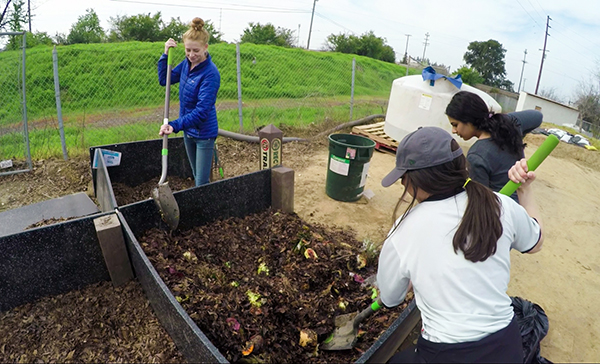 Who doesn't love to play in the leaves? These students are working hard in Lot 10, turning leaf debris into valuable mulch and compost for the campus. (Sacramento State/Rob Neep)
Who doesn't love to play in the leaves? These students are working hard in Lot 10, turning leaf debris into valuable mulch and compost for the campus. (Sacramento State/Rob Neep)Sacramento State’s efforts to integrate sustainability concepts and theories with academics are getting a boost from an $80,000 grant awarded by the California State University’s Campus as a Living Lab (CALL) program.
The funding will cover the redesign of Urban Agriculture, a course in the Department of Environmental Studies, and help defray the cost of bringing electrical power and running water to Parking Lot 10, which has been partly converted to a composting yard.
“It all started at STORC (the Sustainable Technology Optimization Research Center), where faculty and students came up with the idea of vermicomposting (using earthworms to turn organic waste into high-quality compost),” says Ryan Todd, Sac State's sustainability manager. “The next step is to expand it to the campus as a whole by processing all of our food and landscaping waste at the composting area.
“For now, our post-consumer food waste is going off campus to Clean World for anaerobic digestion and the creation of bio-CNG (compressed natural gas). Part of the grant we received will go toward getting a grinder up and running so we’re able to handle both pre- and post-consumer food waste. In other words, that phase and the incorporation of composting into the Urban Ag course will align and hopefully equal 100 percent organic-waste collection.”
The CALL program matches the CSU's commitment to sustainability with its longstanding objective of preparing students for the workforce. As a part of the Urban Ag course, students will do hands-on work in the yard, creating compost and mulch for the 3,500 trees on campus.
For now, Lot 10 has no power or running water, just a tank for collecting rainwater. The CALL grant will provide $68,000 toward a much-needed upgrade.
“Having power and water on demand will make life a lot easier,” Todd says. “And we’ll put in walking paths to create a safe area that is aesthetically pleasing and that we can bring visitors to.”
Sac State produces approximately 450 tons of lawn, leaf, and food waste each year, and the University has a goal of “closing the loop” by recycling every bit of it.
The University’s sustainability efforts are not only landing grants but winning honors.
Later this month, Sac State will pick up two best-practice awards at the 2016 California Higher Education Sustainability Conference (CHESC), to be held at CSU Fullerton:
- Sustainable Food Systems – For the multi-trophic, closed-loop sustainable system developed at STORC, which blends vermiculture and soldier fly production with aquaponics to convert biowaste into high-quality fish and vegetables that will be served at Epicure Restaurant on campus.
- Innovative Waste Reduction – For converting food waste from the Dining Commons into bio-CNG that powers Hornet Express shuttles. Last year, the shuttles transported 51,000 riders to and from campus, offsetting greenhouse gas emissions by more than 300 metric tons.
In addition, a team of Sac State students awaits word on a $75,000 grant from the Environmental Protection Agency’s 12th annual People, Prosperity and the Planet (P3) Student Design Competition. They were awarded an initial $15,000 grant that allowed them to travel to Washington, D.C., in April to present the multi-trophic project developed at STORC to a team of judges. The second, larger grant would allow them to perfect their design and perhaps move it into the marketplace.
“The CALL program expands experiential learning opportunities for Sac State students in sustainable processes that will help prepare the next generation of leaders for the social, environmental, and technical challenges of the 21st century,” says Brook Murphy, the professor of biological sciences who will redesign and teach the Urban Ag course. – Dixie Reid
